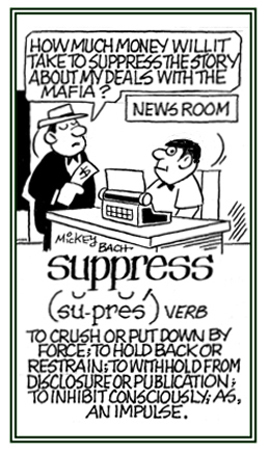sub-, suc-, suf-, sug-, sum-, sup-, sur-, sus-, su-
(Latin: under, below, beneath; used as a prefix as shown in various formats below)
Don't confuse the sur- in this element with the sur- in super-. Note: sub- regularly means "under", but it often changes its form as it retains or keeps its meaning:
The prefix sub- often becomes suc- before c: succumb.
The prefix sub- often becomes suf- before f: suffuse.
The prefix sub- often becomes sug- before g: suggest.
The prefix sub- often becomes sum- before m: sumptuous.
The prefix sub- often becomes sup- before p: suppression.
The prefix sub- often becomes sur- before r: surrogate.
The prefix, sub- is often simplified to su- before sp; as seen in suspect, suspend, suspicion, suspension, et al. Before c, p, and t; it is sometimes formed into sus-.
suppose (verb), supposes; supposed; supposing
1. To assume something is the way it is based on what is possible or apparent; however, without any proof or specific knowledge: He was supposing that he didn't pick up the book from the library after all because he was distracted by going to the bank.
2. To introduce an idea or a concept: Doug asked his wife, "Suppose we ask our banker how we should invest our money?"
3. To believe that something is true: June told her husband that she thought the plumber would charge more than they had supposed.
2. To introduce an idea or a concept: Doug asked his wife, "Suppose we ask our banker how we should invest our money?"
3. To believe that something is true: June told her husband that she thought the plumber would charge more than they had supposed.
suppress (verb), suppresses; suppressed; suppressing
1. To stop or to end something by force or by an authority: The student demonstration for better living conditions on campus was quickly suppressed by the college administrators.
2. To prevent something from being known; to keep secret: The results of the test for Mrs. Smith's classes were suppressed until all of the tests from all the other groups were corrected and graded.
3. To withhold one's feelings or reactions: Jack could not suppress his anger any longer at his sister who broke his cell phone, and so he yelled at her about it.
4. To end or inhibit the bodily functions caused by drugs, an illness, etc.: Radiation can certainly suppress the reproduction and growth of cancerous cells in a person's body.
5. To consciously hinder or restrain an unpleasant memory or idea and avoid pondering or reflecting on it: In order to ward off and suppress the recollections of her mother passing away so suddenly, Mary decided to renovate her living room by wallpapering and painting the walls with bright colors.
6. Etymology: from Latin supprimere "to press down, to stop, to hold back; from sub-, "down" + premere, "to press".

© ALL rights are reserved.
Go to this Word A Day Revisited Index
2. To prevent something from being known; to keep secret: The results of the test for Mrs. Smith's classes were suppressed until all of the tests from all the other groups were corrected and graded.
3. To withhold one's feelings or reactions: Jack could not suppress his anger any longer at his sister who broke his cell phone, and so he yelled at her about it.
4. To end or inhibit the bodily functions caused by drugs, an illness, etc.: Radiation can certainly suppress the reproduction and growth of cancerous cells in a person's body.
5. To consciously hinder or restrain an unpleasant memory or idea and avoid pondering or reflecting on it: In order to ward off and suppress the recollections of her mother passing away so suddenly, Mary decided to renovate her living room by wallpapering and painting the walls with bright colors.
6. Etymology: from Latin supprimere "to press down, to stop, to hold back; from sub-, "down" + premere, "to press".

Go to this Word A Day Revisited Index
so you can see more of Mickey Bach's cartoons.
The act of obtaining something by stealth or secret methods: Shirley practiced surreption so she could get the photograph she wanted of the politician.
surreptitious (adjective), more surreptitious, most surreptitious
1. Referring to something that is accomplished or done by stealth or in a cautious way without anyone being aware of what is going on: Jacob made a surreptitious or a covert glance at a young woman.
2. Relating to an action that is done in a sneaky procedure in order to avoid notice: The cat approached the mouse in a surreptitious way so it could get close enough to catch the rodent.
3. Etymology: in about 1443, from Latin surrepticius, "stolen, furtive, secret, clandestine"; from surreptus, past participle of surripere, "to seize, to take away secretly, to steal".

© ALL rights are reserved.

© ALL rights are reserved.

© ALL rights are reserved.
Go to this Word A Day Revisited Index
2. Relating to an action that is done in a sneaky procedure in order to avoid notice: The cat approached the mouse in a surreptitious way so it could get close enough to catch the rodent.
3. Etymology: in about 1443, from Latin surrepticius, "stolen, furtive, secret, clandestine"; from surreptus, past participle of surripere, "to seize, to take away secretly, to steal".
The word is made up of two parts: sub, "from under" (secretly) + rapere, "to snatch, to seize".



Go to this Word A Day Revisited Index
so you can see more of Mickey Bach's cartoons.
surreptitiously (adverb), more surreptitiously, most surreptitiously
In a concealed or underhanded way in order to escape notice: Janine, the desk clerk, was surreptitiously watching the man who was hanging around in the hotel lobby.
Some people know that China has been surreptitiously accumulating gold by buying up the domestic production in other countries.
1. Something which is obtained, done, or made by clandestine, secret, or stealthy means; that is, trying to avoid being observed: His surreptitiousness in slipping into the bank aroused the curiosity of the security guard.
2. An action which is kept hidden from others or known only to oneself or to a few other people: The private investigator had to act with surreptitiousness in order to determine who had committed the murder in the city.
2. An action which is kept hidden from others or known only to oneself or to a few other people: The private investigator had to act with surreptitiousness in order to determine who had committed the murder in the city.
1. Someone who takes the place of another person: James could not attend the business meeting, so he sent his surrogate.
2. A person appointed to represent or to act on behalf of others: Mike was appointed as the surrogate for his brother in the youth court.
3. Anyone who provides or receives nurture, or parental care, even though when not related by blood or legal ties: Mildred's foster father was a genuine surrogate to her when she was very young.
4. A judge who probates wills and settles estates: Mr. Nelson, the surrogate, worked with the lawyers to sort out the issues of the rich man's estate.
5. In psychology, a substitute authoritative figure; or a respected person who replaces a lost or nonexistent parent in someone's subconscious; such as, a teacher or an older sibling: During counseling, Peter realized that he had thought of his grade seven teacher as a surrogate when he was worried and needed to confide his frustrations to someone other than his father or mother.
6. Etymology: from Latin surrogatus, past participle of surrogare "to put in another's place, a substitute"; from sub, "in the place of, under" + rogare "to ask, to propose".
2. A person appointed to represent or to act on behalf of others: Mike was appointed as the surrogate for his brother in the youth court.
3. Anyone who provides or receives nurture, or parental care, even though when not related by blood or legal ties: Mildred's foster father was a genuine surrogate to her when she was very young.
4. A judge who probates wills and settles estates: Mr. Nelson, the surrogate, worked with the lawyers to sort out the issues of the rich man's estate.
5. In psychology, a substitute authoritative figure; or a respected person who replaces a lost or nonexistent parent in someone's subconscious; such as, a teacher or an older sibling: During counseling, Peter realized that he had thought of his grade seven teacher as a surrogate when he was worried and needed to confide his frustrations to someone other than his father or mother.
6. Etymology: from Latin surrogatus, past participle of surrogare "to put in another's place, a substitute"; from sub, "in the place of, under" + rogare "to ask, to propose".

